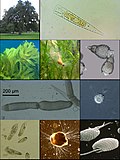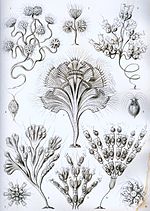The Archaeplastida (or kingdom Plantae sensu lato "in a broad sense"; pronounced /ɑːrkɪˈplæstɪdə/) are a major group of eukaryotes, comprising the photoautotrophic...
42 KB (4,163 words) - 08:41, 23 November 2024
(Stramenopiles), and Arabidopsis thaliana (Linnaeus) Heynhold, 1842 (Archaeplastida), but not Homo sapiens Linnaeus 1758 (Opisthokonta), Dictyostelium discoideum...
8 KB (739 words) - 18:38, 1 November 2024
The CAM clade is a clade containing the Archaeplastida (Plantae sensu lato) and the clade Pancryptista (which, in turn, contains Cryptista and Microheliella...
2 KB (123 words) - 17:03, 15 September 2024
Protist (section Archaeplastida)
spread across several eukaryotic clades called supergroups, such as Archaeplastida (photoautotrophs that includes land plants), SAR, Obazoa (which includes...
148 KB (15,438 words) - 16:15, 17 December 2024
and b and lack phycobilins. Corroborating this, a basal phagotroph Archaeplastida group has been found in the Rhodelphydia. In some classification systems...
17 KB (1,314 words) - 20:29, 20 December 2024
Glaucophyte (category Archaeplastida)
algae plus land plants (Viridiplantae or Chloroplastida), they form the Archaeplastida. The glaucophytes are of interest to biologists studying the evolution...
11 KB (1,011 words) - 21:42, 2 December 2024
Protozoan infection (section Archaeplastida)
in the supergroups Excavata, Amoebozoa, Harosa (SAR supergroup), and Archaeplastida. They are usually contracted by either an insect vector or by contact...
32 KB (3,716 words) - 02:51, 17 September 2024
agreement for monophyly in the Archaeplastida (including red algae). However, other studies have suggested Archaeplastida is paraphyletic. As of January 2011[update]...
63 KB (6,258 words) - 13:41, 6 December 2024
Cryptista is a clade of alga-like eukaryotes. It is most likely related to Archaeplastida which includes plants and many algae, within the larger group Diaphoretickes...
7 KB (674 words) - 16:14, 3 November 2024
forming the clade called Pancryptista, which would be sister to the Archaeplastida, forming the CAM clade. Yazaki, E; Yabuki, A; Imaizumi, A; Kume, K;...
1 KB (85 words) - 20:35, 23 September 2024
primary endosymbiosis event occurred about 1.5 billion years ago in the Archaeplastida clade—land plants, red algae, green algae and glaucophytes—probably...
29 KB (3,219 words) - 10:04, 11 October 2024
Viridiplantae, along with the red algae and the glaucophytes, in the clade Archaeplastida. There are about 380,000 known species of plants, of which the majority...
95 KB (8,073 words) - 10:09, 21 December 2024
and related forms) and Amoebozoa, and a bikont was the ancestor of Archaeplastida (Plants and relatives), Excavata, Rhizaria, and Chromalveolata. Cavalier-Smith...
9 KB (705 words) - 15:06, 2 September 2024
clade, but may be associated with the Archaeplastida. Cryptista specifically may be sister or part of Archaeplastida, though this could be an artefact due...
26 KB (2,441 words) - 01:22, 10 October 2024
former are a sister group to the SAR group, the latter cluster with the Archaeplastida (plants in the broad sense). The katablepharids are closely related...
14 KB (1,642 words) - 20:40, 14 November 2024
glaucophyte algae, form the supergroup Primoplantae, also known as Archaeplastida or Plantae sensu lato. The ancestral green alga was a unicellular flagellate...
27 KB (2,662 words) - 04:03, 20 December 2024
List of model organisms (section Other Archaeplastida)
This is a list of model organisms used in scientific research. Phages (infecting prokaryotes): Escherichia virus Lambda (Phage lambda) Phi X 174, the first...
46 KB (4,626 words) - 23:40, 15 June 2024
Alveolata and Stramenopiles in Halvaria, as sister to Rhizaria. Amoebozoa Archaeplastida Excavata Opisthokonta Some recent studies do not recover the TSAR clade...
12 KB (1,192 words) - 15:59, 2 December 2024
life cycle stages, is given below (see also the article flagellum): Archaeplastida: most green algae (zoospores and male gametes, except in Zygnematophyceae)...
13 KB (1,337 words) - 12:10, 5 November 2024
traditional supergroups were considered: Amoebozoa, Opisthokonta, "Excavata", Archaeplastida, "Chromalveolata" and Rhizaria. Since then, the eToL has been rearranged...
9 KB (746 words) - 13:05, 20 May 2024
many exceptions), are often referred to as bikonts. Bikonts include Archaeplastida (plants and relatives) and SAR supergroup, the Cryptista, Haptista,...
9 KB (1,160 words) - 16:46, 18 June 2024
v t e Classification of Archaeplastida or Plantae s.l. Domain Archaea Bacteria Eukaryota (major groups Excavata Diaphoretickes Hacrobia Cryptista Rhizaria...
137 KB (14,806 words) - 08:35, 19 December 2024
v t e Classification of Archaeplastida or Plantae s.l. Domain Archaea Bacteria Eukaryota (major groups Excavata Diaphoretickes Hacrobia Cryptista Rhizaria...
23 KB (2,031 words) - 23:19, 10 December 2024
SAR+Telonemia supergroup, but it may also be sister to the Cryptista (+Archaeplastida). It is thus one of the earliest diverging Diaphoretickes. Based on...
5 KB (508 words) - 09:54, 7 August 2024
(slime-molds) Archamoebae Lobosa Protamoebae Bikonta Apusozoa Excavata Archaeplastida (plants, broadly defined) Glaucophyta – glaucophytes Rhodophyceae –...
11 KB (767 words) - 16:50, 20 July 2024
v t e Classification of Archaeplastida or Plantae s.l. Domain Archaea Bacteria Eukaryota (major groups Excavata Diaphoretickes Hacrobia Cryptista Rhizaria...
80 KB (6,327 words) - 10:51, 10 December 2024
Protists in the fossil record (section Archaeplastida)
A protist is any eukaryotic organism (that is, an organism whose cells contain a cell nucleus) that is not an animal, plant, or fungus. While it is likely...
70 KB (7,729 words) - 07:09, 4 January 2024
Charophyceae Zygnematophyceae Coleochaetophyceae Embryophyta (land plants) Archaeplastida Adl et al. 2005[citation needed] Chloroplastida Adl et al. 2005 (Viridiplantae...
15 KB (1,223 words) - 01:20, 29 November 2024

























